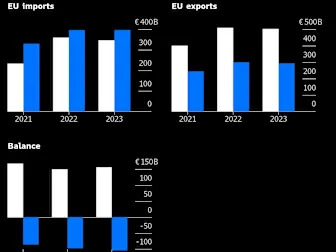(Bloomberg) -- European officials sought to portray a unified calm after US President Donald Trump threatened to impose a 50% tariff on the bloc’s imports, a potential escalation that sent stocks tumbling on both sides of the Atlantic on concerns a trade war will disrupt the world’s largest commercial and investment relationship.
Hours before negotiators in Washington and Brussels were scheduled to hold a call to discuss next steps toward a deal, Trump blasted the European Union in a social media post early Friday for being “difficult to deal with” in “discussions that are going nowhere!”
Trump’s threat of an additional 30% — on top of his proposed 20% reciprocal rate that’s frozen at 10% until a 90-day suspension ends around July 9 — has echoes of his strategy with China during a tit-for-tat volley last month that wound up with a 145% US tariffs on Chinese imports. He backpedaled when financial markets slumped, and on May 12 announced a reduction of those peak duties for a separate 90-day stretch to give time for negotiations.
US Treasury Secretary Scott Bessent, who just concluded meetings with Group of Seven finance ministers in Canada, said on Fox News that “I would hope that this would light a fire under the EU.”
In response, European officials tried to project restraint and a determination to keep talking, with several using the word “calm” to describe what’s needed as the 27-nation bloc faces the potential for frayed economic ties with its largest trading partner.
‘Look Calmly’
“This is all part of the negotiation,” Dutch Prime Minister Dick Schoof said Friday during a weekly press conference. “We will look calmly at the proposals and respond robustly and firmly.”
Part of Europe’s challenge is a lack of details about what the US wants. “It remains unclear what the US administration actually expects in order to still strike a deal, other than the earlier contemplated unilateral reduction of EU tariffs,” ING economists Inga Fechner, Carsten Brzeski and Chris Turner wrote in a research note Friday.
Swedish Finance Minister Elisabeth Svantesson called Trump’s latest pledge “an unreasonable escalation that could harm both the American and European economies,” adding that “we need more free trade, not less.”
Germany’s new Economics and Trade Minister Katherina Reiche warned of bad outcomes for both sides if the rhetoric becomes policy.
“There are no winners in tariff disputes,” Reiche told the Rheinische Post newspaper. “We must do everything we can to ensure that the European Commission reaches a negotiated solution with the USA. Such high tariffs damage the US and the EU in equal measure.”
Irish deputy Prime Minister Simon Harris said negotiations remain the EU and Ireland’s focus.
“We need a substantive, calm, measured and comprehensive dialog with the United States,” Harris said. “Our deep and enduring relationship with the United States merits a more sustained and substantive engagement in the period ahead in a bid to bring about a negotiated settlement.”
French Trade Minister Laurent Saint-Martin said in a post on X that “we are maintaining the same line: de-escalation, but we are ready to respond.”
Simone Tagliapietra, senior fellow at Bruegel think tank in Brussels, called Trump’s announcement “a cold shower for Brussels — though there is still hope that this is yet another negotiating tactic aimed at increasing pressure on the talks.”
Brad Setser, a former US Treasury official now at the Council on Foreign Relations, said the EU’s next move might to retaliate if Trump carries out his threat.
“Trump likely has put Europe in a position where the European Commission and the key member states will conclude that they have to escalate to de-escalate,” he wrote in a post on X. “Unless Trump can be persuaded to step back and wait for a new European offer in the next ten days, the EU will likely start its retaliation process.”
The EU has prepared tariffs on €21 billion of US goods in response to Trump’s metals levies — but paused the implementation until mid-July. But implementation could be accelerated in the event of a breakdown in talks.
The bloc is also preparing an additional list of tariffs on €95 billion of American products in the event negotiations with Washington fail. Those measures would target industrial goods including Boeing Co. aircraft, US-made cars and bourbon.
--With assistance from Alberto Nardelli, Jorge Valero, Jennifer Duggan, Michael Nienaber, Patrick Van Oosterom, Arne Delfs and Alan Katz.


